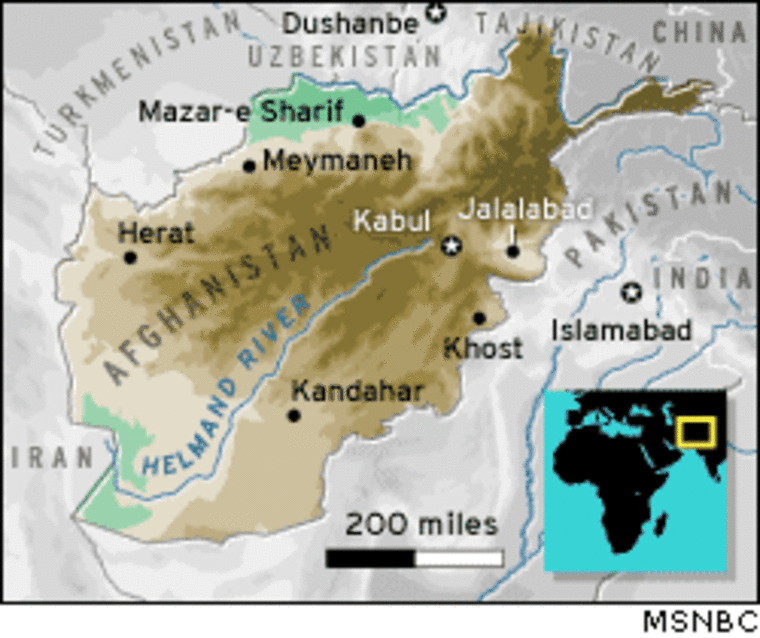Nasrine Gross is an Afghan-American woman, back home in her native land, determined to change an enduring legacy of the Taliban regime. She's trying to teach basic reading and writing to Afghanistan's women. The literacy rate here is among the lowest in the world at just 10 percent.
"When you have that staggering rate of illiteracy, you have a problem with both men and women accepting the participation of women in society," Gross said.
An activist, author, and professor at Kabul University, Gross is putting the finishing touches to a study of Afghan women, two and a half years after the fall of the Taliban. Her study essentially concludes, despite some progress, women here still live rather harsh lives in a very conservative male-dominated society.
Literacy programs
Some of her most important work, the literacy programs, takes place in the dark musty basement of a compound on the edge of the capital.

Gross targets Kabul's poorest areas, because as she put it, "this is where there is not much education, there are not many facilities, so this is where the need is the greatest."
One by one, her students, walk to the board, gingerly take hold of a magic marker, and carefully try to write their names.
Class has just started and the students range in age from 30 to about 75, according to Gross. The students are people who have never been to school before, who don't have a job, but Gross insisted, "they are all thirsty to learn."
One requirement for the class is that husbands and wives, or women with a male relative attend together. It reinforces the idea that men and women are starting at the same place, and trying to accomplish the same goal as equals.
Anisse is one of Gross's new students. She is 30, a mother of 3 children, who has never attended school in her life until now. "I never had the chance to study," she said. "It just wasn't possible."
Women were banned from attending school during the Taliban regime. Anisse, like so many other women here faced problems well before that -- years of war, and life on the run as a refugee excluded education as an option.
Now she's taking the first steps toward reading and writing. Her goals are modest. Things we all take for granted.
"All I can do is try," she said. "At least maybe I'll be able to read the signs on shops, or buses, or be able to read the instructions on medicine for my children."
New world, more challenges
Illiteracy is just one huge problem faced by Afghan women.
The country's new constitution, which gives women equal rights, is considered progressive, especially for the Islamic world. It even guarantees women seats in the national legislature.
But when it comes to family practices, and everyday life, for many Afghan women, not much has changed.
For example, many young women now go to school. You can see crowds of female students leaving afternoon classes and walking the campus of Kabul University. Something unthinkable just 3 years ago.
But even on campus, many women still wear the burka. Across the capital, and especially beyond the main cities, the burka, the most visible symbol of how women live their lives in fear here, is still extremely common.
"People are not sure who is walking around in their areas," explained Gross. "Women are still extremely afraid of the Taliban and al-Qaida."
Despite the presence of more than 20,000 foreign troops, and the new Afghan government's efforts to extend its control beyond the capital of Kabul, the Taliban still exercises a lot of power in the country, especially in the south near Kandahar, the group's traditional stronghold.
That's one reason many women here still rarely venture far from home. Forced marriages remain common. There are concerns that some women here even take the extreme step of committing suicide, or severely burning themselves to protest.
Health care for women is so poor that one mother dies in child birth every 30 minutes.
Commitment to help other Afghan women
Gross gave up a good life in suburban Virginia and decided to stay here in Afghanistan to help the country's women try to achieve a place of equality and dignity in this society.
"Afghanistan's poverty and backwardness are unimaginable in America," she insisted. "How can I not care about that?"
"I have been lucky to live in America for 30 years in a culture of peace. And if I can help even one iota, that is very meaningful to me," she said.
Her long-term goal is to see the country create opportunities for women to learn skills, find work, and take care of themselves. She hopes to see women here take a much more prominent role in rebuilding the country.
A shorter term goal is to see women register and then vote in national elections planned for September.
But the first step, she said, is basic literacy. In the classroom, her students almost worship her. She admonishes them to take education seriously, work hard, be patient, and the results will come.
Gross said that her dream for her female students is that one day, "they can read their rights in the constitution."